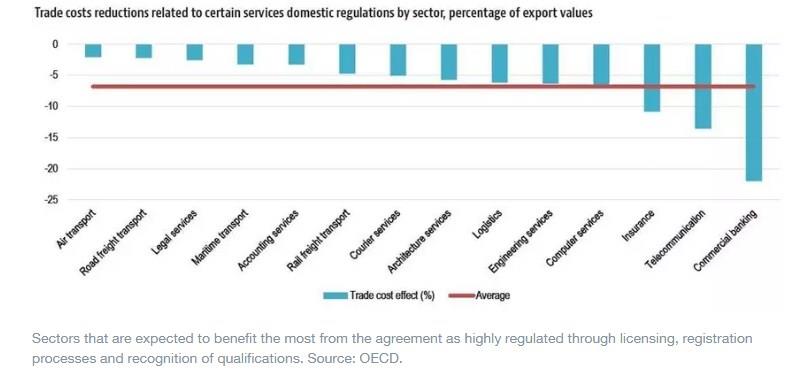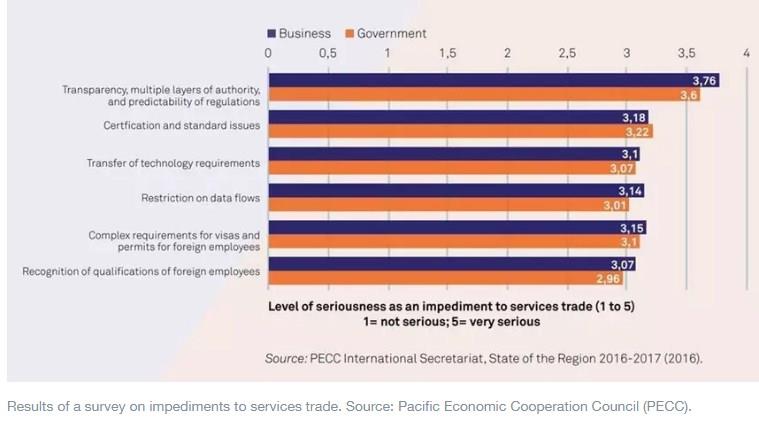by Jaime Coghi*
Services account for two-thirds of global GDP, and more than six out of 10 jobs. In recent years, services export growth has outpaced sluggish growth in merchandise trade, and now accounts for almost half of overall trade measured in value-added terms.
At the same time, services trade costs are twice as high as those for goods, and 40% of these costs are linked to opaque regulations and cumbersome procedures.
A group of 66 WTO Members – responsible for more than 90% of world services trade – have come to an agreement that addresses the practical challenges of service suppliers that want to export to other markets.
The agreement – set out in vintage WTO-speak in the Reference Paper on Services Domestic Regulation – will facilitate services trade by reducing red tape that hinders service suppliers’ operations. The agreement aims to ensure that licensing and qualification requirements and procedures, as well as technical standards do not constitute unnecessary barriers to services trade.
To this end, the agreement facilitates services trade in three main areas:
Greater transparency
The agreement foresees that relevant authorities make available all the information needed by business to comply with requirements and procedures for authorization, including for example, authorization fees, contact points, licensing criteria, and technical standards. In addition, members will have to respond to enquiries by service suppliers through the appropriate mechanisms.
Importantly, the disciplines will improve opportunities for the involvement of suppliers in the regulatory decision-making process, with a call for publication of draft laws and regulations before their adoption and the establishment of opportunities for interested suppliers to submit comments.
Legal certainty and predictability of authorization requirements and procedures
The agreement contains minimum guarantees to be followed by relevant authorities during the licensing and authorization process. This includes several elements such as indicative timeframes for processing applications; availability of information on status and decision on applications; and the possibility to resubmit applications in case of rejection. Furthermore, to facilitate compliance by services providers, the agreement establishes a reasonable period of time between the publication of new laws and regulations and their coming into force.
Regulatory quality and facilitation
The agreement seeks to ensure that regulatory decision making is improved, by requiring the independence and impartiality of regulatory authorities when dealing with authorization applications. It also encourages the acceptance of electronic applications and authenticated copies of documents, and requires that authorization fees are transparent and reasonable, and not unduly restrict possibilities to supply services.
Here are five things that the agreement will achieve:
1. Lower trade costs
Recent OECD findings suggest that the benefits from implementing the reference paper will result in significant reductions in trade costs, particularly in important backbone services sectors. Implementation among the G20 economies can potentially reduce trade costs of up to 6% over three to five years. The effects would be greater in highly regulated sectors, where licensing processes and recognition of qualifications are more prominent. These sectors include commercial banking (-21%), telecommunications (-10%), and insurance (-9%). Trade in computer services would also be facilitated (-6%). Among professional services, benefits would be equally significant for engineering (-6%) and architecture services (-6%). The savings could amount to more than $140 billion in the medium term.

2. Boost services sector growth and stimulate further services trade
According to recent WTO analysis, economies which are following the good regulatory practice set out in the agreement are seeing a greater contribution of services to GDP, as opposed to agriculture and manufacturing. Services sector growth is in turn associated with job creation, competitiveness and productivity and output diversification. Enhancing the efficiency of services can indirectly improve firms’ competitiveness in the manufacturing sector.
What is more, economies that are following the good regulatory practice set out in the agreement trade substantially more services than economies with less well-regulated services sectors. Services trade is critical to economic growth and development. For developing economies, services trade offers opportunities to build know-how and technological capacity and achieve competitiveness at a global level.
3. Lead to higher participation in global value chains (GVCs)
Recent WTO analysis suggests that economies that apply more aspects of the agreement tend to be more actively involved in value chains. Economic benefits associated with participation in GVCs relate to increased productivity and diversification of exports. In addition, GVCs promote employment and further spill over effects, including knowledge and technological progress, skills development, and improved working conditions. As GVCs rely intensively on services, barriers to authorization requirements and procedures that regulate the supply of services play a particularly important role.
4. Benefit small businesses and women entrepreneurs
The costs of inefficient and non-transparent regulation fall more heavily on smaller players who typically face more limited resources to navigate costly and opaque requirement procedures. In many cases, the latter can make market entry for small businesses and women entrepreneurs prohibitively costly, leading to otherwise profitable business opportunities being forsaken. At a time when businesses around the world demand greater transparency and predictability of regulatory environments, they will be the first to gain.

5. Pave the way for more flexible approaches to trade cooperation at the WTO
It will signal that groups of WTO members that have identified common interests can address without being held up by other members that make their approval conditional on pay offs in other areas. Of course, such outcomes need to be extended to all WTO members to comply with the most favored nation principle, and they need to cover issues that fall within the gambit of existing WTO agreements. But there are many such issues for which a critical mass of members may move ahead – services market access is a case in point.
With the level of multilateral liberalization remaining frozen at the level of 1995, an update is urgently needed to add legal certainty to the services liberalization undertaken autonomously and regionally in the last 25 years.
*Deputy Permanent Representative, Mission of Costa Rica to the WTO, and Chair, WTO Joint Initiative on Services Domestic Regulation
**first published in: www.weforum.org




 By: N. Peter Kramer
By: N. Peter Kramer

